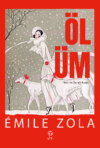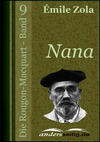Kitabı oku: «His Masterpiece», sayfa 25
‘There, my darling, that’s enough, isn’t it?’ he said. ‘You’ll soon see how big and pretty you’ll become.’
He then placed Alice in the perambulator again, took Gaston, who was still wrapped up, on one of his arms; and when his friends wished to help him, he declined their offer, pushing the little girl’s vehicle along with his right hand, which had remained free.
‘Thanks,’ he said, ‘I’m accustomed to it. Ah! the poor darlings are not heavy; and besides, with servants one can never be sure of anything.’
On entering the house, Sandoz and Claude again saw the valet who had been so insolent; and they noticed that Dubuche trembled before him. The kitchen and the hall shared the contempt of the father-in-law, who paid for everything, and treated ‘madame’s’ husband like a beggar whose presence was merely tolerated out of charity. Each time that a shirt was got ready for him, each time that he asked for some more bread, the servants’ impolite gestures made him feel that he was receiving alms.
‘Well, good-bye, we must leave you,’ said Sandoz, who suffered at the sight of it all.
‘No, no, wait a bit. The children are going to breakfast, and afterwards I’ll accompany you with them. They must go for their outing.’
Each day was regulated hour by hour. Of a morning came the baths and the gymnastics; then the breakfast, which was quite an affair, as the children needed special food, which was duly discussed and weighed. And matters were carried to such a point that even their wine and water was slightly warmed, for fear that too chilly a drop might give them a cold. On this occasion they each partook of the yolk of an egg diluted in some broth, and a mutton cutlet, which the father cut up into tiny morsels. Then, prior to the siesta, came the promenade.
Sandoz and Claude found themselves once more out-of-doors, walking down the broad avenues with Dubuche, who again propelled Alice’s perambulator, whilst Gaston walked beside him. They talked about the estate as they went towards the gate. The master glanced over the park with timid, nervous eyes, as if he did not feel at home. Besides he did not know anything; he did not occupy himself about anything. He appeared even to have forgotten the profession which he was said to be ignorant of, and seemed to have gone astray, to be bowed down by sheer inaction.
‘And your parents, how are they?’ asked Sandoz.
A spark was once more kindled in Dubuche’s dim eyes.
‘Oh! my parents are happy,’ he said; ‘I bought them a little house, where they live on the annuity which I had specified in my marriage contract. Well, you see, mamma had advanced enough money for my education, and I had to return it to her, as I had promised, eh? Yes, I can at least say that my parents have nothing to reproach me with.’
Having reached the gate, they tarried there for a few minutes. At last, still looking crushed, Dubuche shook hands with his old comrades; and retaining Claude’s hand in his, he concluded, as if making a simple statement of fact quite devoid of anger:
‘Good-bye; try to get out of worry! As for me, I’ve spoilt my life.’
And they watched him walk back towards the house, pushing the perambulator, and supporting Gaston, who was already stumbling with fatigue – he, Dubuche, himself having his back bent and the heavy tread of an old man.
One o’clock was striking, and they both hurried down towards Bennecourt, saddened and ravenous. But mournfulness awaited them there as well; a murderous blast had swept over the place, both Faucheurs, husband and wife, and old Porrette, were all dead; and the inn, having fallen into the hands of that goose Melie, was becoming repugnant with its filth and coarseness. An abominable repast was served them, an omelette with hairs in it, and cutlets smelling of grease, in the centre of the common room, to which an open window admitted the pestilential odour of a dung heap, while the place was so full of flies that they positively blackened the tables. The heat of the burning afternoon came in with the stench, and Claude and Sandoz did not even feel the courage to order any coffee; they fled.
‘And you who used to extol old Mother Faucheur’s omelettes!’ said Sandoz. ‘The place is done for. We are going for a turn, eh?’
Claude was inclined to refuse. Ever since the morning he had had but one idea – that of walking on as fast as possible, as if each step would shorten the disagreeable task and bring him back to Paris. His heart, his head, his whole being had remained there. He looked neither to right nor to left, he glided along without distinguishing aught of the fields or trees, having but one fixed idea in his brain, a prey to such hallucinations that at certain moments he fancied the point of the Cite rose up and called to him from amid the vast expanse of stubble. However, Sandoz’s proposal aroused memories in his mind; and, softening somewhat, he replied:
‘Yes, that’s it, we’ll have a look.’
But as they advanced along the river bank, he became indignant and grieved. He could scarcely recognise the place. A bridge had been built to connect Bennecourt with Bonnieres: a bridge, good heavens! in the place of the old ferry-boat, grating against its chain – the old black boat which, cutting athwart the current, had been so full of interest to the artistic eye. Moreover, a dam established down-stream at Port-Villez had raised the level of the river, most of the islands of yore were now submerged, and the little armlets of the stream had become broader. There were no more pretty nooks, no more rippling alleys amid which one could lose oneself; it was a disaster that inclined one to strangle all the river engineers!
‘Why, that clump of pollards still emerging from the water on the left,’ cried Claude, ‘was the Barreux Island, where we used to chat together, lying on the grass! You remember, don’t you? Ah! the scoundrels!’
Sandoz, who could never see a tree felled without shaking his fist at the wood-cutter, turned pale with anger, and felt exasperated that the authorities had thus dared to mutilate nature.
Then, as Claude approached his old home, he became silent, and his teeth clenched. The house had been sold to some middle-class folk, and now there was an iron gate, against which he pressed his face. The rose-bushes were all dead, the apricot trees were dead also; the garden, which looked very trim, with its little pathways and its square-cut beds of flowers and vegetables, bordered with box, was reflected in a large ball of plated glass set upon a stand in the very centre of it; and the house, newly whitewashed and painted at the corners and round the doors and windows, in a manner to imitate freestone, suggested some clownish parvenu awkwardly arrayed in his Sunday toggery. The sight fairly enraged the painter. No, no, nothing of himself, nothing of Christine, nothing of the great love of their youth remained there! He wished to look still further; he turned round behind the house, and sought for the wood of oak trees where they had left the living quiver of their embraces; but the wood was dead, dead like all the rest, felled, sold, and burnt! Then he made a gesture of anathema, in which he cast all his grief to that stretch of country which was now so changed that he could not find in it one single token of his past life. And so a few years sufficed to efface the spot where one had laboured, loved, and suffered! What was the use of man’s vain agitation if the wind behind him swept and carried away all the traces of his footsteps? He had rightly realised that he ought not to return thither, for the past is simply the cemetery of our illusions, where our feet for ever stumble against tombstones!
‘Let us go!’ he cried; ‘let us go at once! It’s stupid to torture one’s heart like this!’
When they were on the new bridge, Sandoz tried to calm him by showing him the view which had not formerly existed, the widened bed of the Seine, full to the brim, as it were, and the water flowing onward, proudly and slowly. But this water failed to interest Claude, until he reflected that it was the same water which, as it passed through Paris, had bathed the old quay walls of the Cite; and then he felt touched, he leant over the parapet of the bridge for a moment, and thought that he could distinguish glorious reflections in it – the towers of Notre-Dame, and the needle-like spire of the Sainte-Chapelle, carried along by the current towards the sea.
The two friends missed the three o’clock train, and it was real torture to have to spend two long hours more in that region, where everything weighed so heavily on their shoulders. Fortunately, they had forewarned Christine and Madame Sandoz that they might return by a night train if they were detained. So they resolved upon a bachelor dinner at a restaurant on the Place du Havre, hoping to set themselves all right again by a good chat at dessert as in former times. Eight o’clock was about to strike when they sat down to table.
Claude, on leaving the terminus, with his feet once more on the Paris pavement, had lost his nervous agitation, like a man who at last finds himself once more at home. And with the cold, absent-minded air which he now usually displayed, he listened to Sandoz trying to enliven him. The novelist treated his friend like a mistress whose head he wished to turn; they partook of delicate, highly spiced dishes and heady wines. But mirth was rebellious, and Sandoz himself ended by becoming gloomy. All his hopes of immortality were shaken by his excursion to that ungrateful country village, that Bennecourt, so loved and so forgetful, where he and Claude had not found a single stone retaining any recollection of them. If things which are eternal forget so soon, can one place any reliance for one hour on the memory of man?
‘Do you know, old fellow,’ said the novelist, ‘it’s that which sometimes sends me into a cold sweat. Have you ever reflected that posterity may not be the faultless dispenser of justice that we dream of? One consoles oneself for being insulted and denied, by relying on the equity of the centuries to come; just as the faithful endure all the abominations of this earth in the firm belief of another life, in which each will be rewarded according to his deserts. But suppose Paradise exists no more for the artist than it does for the Catholic, suppose that future generations prolong the misunderstanding and prefer amiable little trifles to vigorous works! Ah! what a sell it would be, eh? To have led a convict’s life – to have screwed oneself down to one’s work – all for a mere delusion! Please notice that it’s quite possible, after all. There are some consecrated reputations which I wouldn’t give a rap for. Classical education has deformed everything, and has imposed upon us as geniuses men of correct, facile talent, who follow the beaten track. To them one may prefer men of free tendencies, whose work is at times unequal; but these are only known to a few people of real culture, so that it looks as if immortality might really go merely to the middle-class “average” talent, to the men whose names are forced into our brains at school, when we are not strong enough to defend ourselves. But no, no, one mustn’t say those things; they make me shudder! Should I have the courage to go on with my task, should I be able to remain erect amid all the jeering around me if I hadn’t the consoling illusion that I shall some day be appreciated?’
Claude had listened with his dolorous expression, and he now made a gesture of indifference tinged with bitterness.
‘Bah! what does it matter? Well, there’s nothing hereafter. We are even madder than the fools who kill themselves for a woman. When the earth splits to pieces in space like a dry walnut, our works won’t add one atom to its dust.’
‘That’s quite true,’ summed up Sandoz, who was very pale. ‘What’s the use of trying to fill up the void of space? And to think that we know it, and that our pride still battles all the same!’
They left the restaurant, roamed about the streets, and foundered again in the depths of a cafe, where they philosophised. They had come by degrees to raking up the memories of their childhood, and this ended by filling their hearts with sadness. One o’clock in the morning struck when they decided to go home.
However, Sandoz talked of seeing Claude as far as the Rue Tourlaque. That August night was a superb one, the air was warm, the sky studded with stars. And as they went the round by way of the Quartier de l’Europe, they passed before the old Cafe Baudequin on the Boulevard des Batignolles. It had changed hands three times. It was no longer arranged inside in the same manner as formerly; there were now a couple of billiard tables on the right hand; and several strata of customers had followed each other thither, one covering the other, so that the old frequenters had disappeared like buried nations. However, curiosity, the emotion they had derived from all the past things they had been raking up together, induced them to cross the boulevard and to glance into the cafe through the open doorway. They wanted to see their table of yore, on the left hand, right at the back of the room.
‘Oh, look!’ said Sandoz, stupefied.
‘Gagniere!’ muttered Claude.
It was indeed Gagniere, seated all alone at that table at the end of the empty cafe. He must have come from Melun for one of the Sunday concerts to which he treated himself; and then, in the evening, while astray in Paris, an old habit of his legs had led him to the Cafe Baudequin. Not one of the comrades ever set foot there now, and he, who had beheld another age, obstinately remained there alone. He had not yet touched his glass of beer; he was looking at it, so absorbed in thought that he did not even stir when the waiters began piling the chairs on the tables, in order that everything might be ready for the morrow’s sweeping.
The two friends hurried off, upset by the sight of that dim figure, seized as it were with a childish fear of ghosts. They parted in the Rue Tourlaque.
‘Ah! that poor devil Dubuche!’ said Sandoz as he pressed Claude’s hand, ‘he spoilt our day for us.’
As soon as November had come round, and when all the old friends were back in Paris again, Sandoz thought of gathering them together at one of those Thursday dinners which had remained a habit with him. They were always his greatest delight. The sale of his books was increasing, and he was growing rich; the flat in the Rue de Londres was becoming quite luxurious compared with the little house at Batignolles; but he himself remained immutable. On this occasion, he was anxious, in his good nature, to procure real enjoyment for Claude by organising one of the dear evenings of their youth. So he saw to the invitations; Claude and Christine naturally must come; next Jory and his wife, the latter of whom it had been necessary to receive since her marriage, then Dubuche, who always came alone, with Fagerolles, Mahoudeau, and finally Gagniere. There would be ten of them – all the men comrades of the old band, without a single outsider, in order that the good understanding and jollity might be complete.
Henriette, who was more mistrustful than her husband, hesitated when this list of guests was decided upon.
‘Oh! Fagerolles? You believe in having Fagerolles with the others? They hardly like him – nor Claude either; I fancied I noticed a coolness – ’
But he interrupted her, bent on not admitting it.
‘What! a coolness? It’s really funny, but women can’t understand that fellows chaff each other. All that doesn’t prevent them from having their hearts in the right place.’
Henriette took especial care in preparing the menu for that Thursday dinner. She now had quite a little staff to overlook, a cook, a man-servant, and so on; and if she no longer prepared any of the dishes herself, she still saw that very delicate fare was provided, out of affection for her husband, whose sole vice was gluttony. She went to market with the cook, and called in person on the tradespeople. She and her husband had a taste for gastronomical curiosities from the four corners of the world. On this occasion they decided to have some ox-tail soup, grilled mullet, undercut of beef with mushrooms, raviolis in the Italian fashion, hazel-hens from Russia, and a salad of truffles, without counting caviare and kilkis as side-dishes, a glace pralinee, and a little emerald-coloured Hungarian cheese, with fruit and pastry. As wine, some old Bordeaux claret in decanters, chambertin with the roast, and sparkling moselle at dessert, in lieu of champagne, which was voted commonplace.
At seven o’clock Sandoz and Henriette were waiting for their guests, he simply wearing a jacket, and she looking very elegant in a plain dress of black satin. People dined at their house in frock-coats, without any fuss. The drawing-room, the arrangements of which they were now completing, was becoming crowded with old furniture, old tapestry, nick-nacks of all countries and all times – a rising and now overflowing stream of things which had taken source at Batignolles with an old pot of Rouen ware, which Henriette had given her husband on one of his fete days. They ran about to the curiosity shops together; a joyful passion for buying possessed them. Sandoz satisfied the longings of his youth, the romanticist ambitions which the first books he had read had given birth to. Thus this writer, so fiercely modern, lived amid the worm-eaten middle ages which he had dreamt of when he was a lad of fifteen. As an excuse, he laughingly declared that handsome modern furniture cost too much, whilst with old things, even common ones, you immediately obtained something with effect and colour. There was nothing of the collector about him, he was entirely concerned as to decoration and broad effects; and to tell the truth, the drawing-room, lighted by two lamps of old Delft ware, had quite a soft warm tint with the dull gold of the dalmaticas used for upholstering the seats, the yellowish incrustations of the Italian cabinets and Dutch show-cases, the faded hues of the Oriental door-hangings, the hundred little notes of the ivory, crockery and enamel work, pale with age, which showed against the dull red hangings of the room.
Claude and Christine were the first to arrive. The latter had put on her only silk dress – an old, worn-out garment which she preserved with especial care for such occasions. Henriette at once took hold of both her hands and drew her to a sofa. She was very fond of her, and questioned her, seeing her so strange, touchingly pale, and with anxious eyes. What was the matter? Did she feel poorly? No, no, she answered that she was very gay and very pleased to come; but while she spoke, she kept on glancing at Claude, as if to study him, and then looked away. He seemed excited, evincing a feverishness in his words and gestures which he had not shown for a month past. At intervals, however, his agitation subsided, and he remained silent, with his eyes wide open, gazing vacantly into space at something which he fancied was calling him.
‘Ah! old man,’ he said to Sandoz, ‘I finished reading your book last night. It’s deucedly clever; you have shut up their mouths this time!’
They both talked standing in front of the chimney-piece, where some logs were blazing. Sandoz had indeed just published a new novel, and although his critics did not disarm, there was at last that stir of success which establishes a man’s reputation despite the persistent attacks of his adversaries. Besides, he had no illusions; he knew very well that the battle, even if it were won, would begin again at each fresh book he wrote. The great work of his life was advancing, that series of novels which he launched forth in volumes one after another in stubborn, regular fashion, marching towards the goal he had selected without letting anything, obstacles, insults, or fatigue, conquer him.
‘It’s true,’ he gaily replied, ‘they are weakening this time. There’s even one who has been foolish enough to admit that I’m an honest man! See how everything degenerates! But they’ll make up for it, never fear! I know some of them whose nuts are too much unlike my own to let them accept my literary formula, my boldness of language, and my physiological characters acting under the influence of circumstances; and I refer to brother writers who possess self-respect; I leave the fools and the scoundrels on one side. For a man to be able to work on pluckily, it is best for him to expect neither good faith nor justice. To be in the right he must begin by dying.’
At this Claude’s eyes abruptly turned towards a corner of the drawing-room, as if to pierce the wall and go far away yonder, whither something had summoned him. Then they became hazy and returned from their journey, whilst he exclaimed:
‘Oh! you speak for yourself! I should do wrong to kick the bucket. No matter, your book sent me into a deuced fever. I wanted to paint to-day, but I couldn’t. Ah! it’s lucky that I can’t get jealous of you, else you would make me too unhappy.’
However, the door had opened, and Mathilde came in, followed by Jory. She was richly attired in a tunic of nasturtium-hued velvet and a skirt of straw-coloured satin, with diamonds in her ears and a large bouquet of roses on her bosom. What astonished Claude the most was that he did not recognise her, for she had become plump, round, and fair skinned, instead of thin and sunburnt as he had known her. Her disturbing ugliness had departed in a swelling of the face; her mouth, once noted for its black voids, now displayed teeth which looked over-white whenever she condescended to smile, with a disdainful curling of the upper lip. You could guess that she had become immoderately respectable; her five and forty summers gave her weight beside her husband, who was younger than herself and seemed to be her nephew. The only thing of yore that clung to her was a violent perfume; she drenched herself with the strongest essences, as if she had been anxious to wash from her skin the smell of all the aromatic simples with which she had been impregnated by her herbalist business; however, the sharpness of rhubarb, the bitterness of elder-seed, and the warmth of peppermint clung to her; and as soon as she crossed the drawing-room, it was filled with an undefinable smell like that of a chemist’s shop, relieved by an acute odour of musk.
Henriette, who had risen, made her sit down beside Christine, saying:
‘You know each other, don’t you? You have already met here.’
Mathilde gave but a cold glance at the modest attire of that woman who had lived for a long time with a man, so it was said, before being married to him. She herself was exceedingly rigid respecting such matters since the tolerance prevailing in literary and artistic circles had admitted her to a few drawing-rooms. Henriette hated her, however, and after the customary exchange of courtesies, not to be dispensed with, resumed her conversation with Christine.
Jory had shaken hands with Claude and Sandoz, and, standing near them, in front of the fireplace, he apologised for an article slashing the novelist’s new book which had appeared that very morning in his review.
‘As you know very well, my dear fellow, one is never the master in one’s own house. I ought to see to everything, but I have so little time! I hadn’t even read that article, I relied on what had been told me about it. So you will understand how enraged I was when I read it this afternoon. I am dreadfully grieved, dreadfully grieved – ’
‘Oh, let it be! It’s the natural order of things,’ replied Sandoz, quietly. ‘Now that my enemies are beginning to praise me, it’s only proper that my friends should attack me.’
The door again opened, and Gagniere glided in softly, like a will-o’-the-wisp. He had come straight from Melun, and was quite alone, for he never showed his wife to anybody. When he thus came to dinner he brought the country dust with him on his boots, and carried it back with him the same night on taking the last train. On the other hand, he did not alter; or, rather, age seemed to rejuvenate him; his complexion became fairer as he grew old.
‘Hallo! Why, Gagniere’s here!’ exclaimed Sandoz.
Then, just as Gagniere was making up his mind to bow to the ladies, Mahoudeau entered. He had already grown grey, with a sunken, fierce-looking face and childish, blinking eyes. He still wore trousers which were a good deal too short for him, and a frock-coat which creased in the back, in spite of the money which he now earned; for the bronze manufacturer for whom he worked had brought out some charming statuettes of his, which one began to see on middle-class mantel-shelves and consoles.
Sandoz and Claude had turned round, inquisitive to witness the meeting between Mahoudeau and Mathilde. However, matters passed off very quietly. The sculptor bowed to her respectfully, while Jory, the husband, with his air of serene unconsciousness, thought fit to introduce her to him, for the twentieth time, perhaps.
‘Eh! It’s my wife, old fellow. Shake hands together.’
Thereupon, both very grave, like people of society who are forced somewhat over-promptly into familiarity, Mathilde and Mahoudeau shook hands. Only, as soon as the latter had got rid of the job and had found Gagniere in a corner of the drawing-room, they both began sneering and recalling, in terrible language, all the abominations of yore.
Dubuche was expected that evening, for he had formally promised to come.
‘Yes,’ explained Henriette, ‘there will only be nine of us. Fagerolles wrote this morning to apologise; he is forced to go to some official dinner, but he hopes to escape, and will join us at about eleven o’clock.’
At that moment, however, a servant came in with a telegram. It was from Dubuche, who wired: ‘Impossible to stir. Alice has an alarming cough.’
‘Well, we shall only be eight, then,’ resumed Henriette, with the somewhat peevish resignation of a hostess disappointed by her guests.
And the servant having opened the dining-room door and announced that dinner was ready, she added:
‘We are all here. Claude, offer me your arm.’
Sandoz took Mathilde’s, Jory charged himself with Christine, while Mahoudeau and Gagniere brought up the rear, still joking coarsely about what they called the beautiful herbalist’s padding.
The dining-room which they now entered was very spacious, and the light was gaily bright after the subdued illumination of the drawing-room. The walls, covered with specimens of old earthenware, displayed a gay medley of colours, reminding one of cheap coloured prints. Two sideboards, one laden with glass and the other with silver plate, sparkled like jewellers’ show-cases. And in the centre of the room, under the big hanging lamp girt round with tapers, the table glistened like a catafalque with the whiteness of its cloth, laid in perfect style, with decorated plates, cut-glass decanters white with water or ruddy with wine, and symmetrical side-dishes, all set out around the centre-piece, a silver basket full of purple roses.
They sat down, Henriette between Claude and Mahoudeau, Sandoz with Mathilde and Christine beside him, Jory and Gagniere at either end; and the servant had barely finished serving the soup, when Madame Jory made a most unfortunate remark. Wishing to show herself amiable, and not having heard her husband’s apologies, she said to the master of the house:
‘Well, were you pleased with the article in this morning’s number? Edouard personally revised the proofs with the greatest care!’
On hearing this, Jory became very much confused and stammered:
‘No, no! you are mistaken! It was a very bad article indeed, and you know very well that it was “passed” the other evening while I was away.’
By the silent embarrassment which ensued she guessed her blunder. But she made matters still worse, for, giving her husband a sharp glance, she retorted in a very loud voice, so as to crush him, as it were, and disengage her own responsibility:
‘Another of your lies! I repeat what you told me. I won’t allow you to make me ridiculous, do you hear?’
This threw a chill over the beginning of the dinner. Henriette recommended the kilkis, but Christine alone found them very nice. When the grilled mullet appeared, Sandoz, who was amused by Jory’s embarrassment, gaily reminded him of a lunch they had had together at Marseilles in the old days. Ah! Marseilles, the only city where people know how to eat!
Claude, who for a little while had been absorbed in thought, now seemed to awaken from a dream, and without any transition he asked:
‘Is it decided? Have they selected the artists for the new decorations of the Hotel de Ville?’
‘No,’ said Mahoudeau, ‘they are going to do so. I sha’n’t get anything, for I don’t know anybody. Fagerolles himself is very anxious. If he isn’t here to-night, it’s because matters are not going smoothly. Ah! he has had his bite at the cherry; all that painting for millions is cracking to bits!’
There was a laugh, expressive of spite finally satisfied, and even Gagniere at the other end of the table joined in the sneering. Then they eased their feelings in malicious words, and rejoiced over the sudden fall of prices which had thrown the world of ‘young masters’ into consternation. It was inevitable, the predicted time was coming, the exaggerated rise was about to finish in a catastrophe. Since the amateurs had been panic-stricken, seized with consternation like that of speculators when a ‘slump’ sweeps over a Stock Exchange, prices were giving way day by day, and nothing more was sold. It was a sight to see the famous Naudet amid the rout; he had held out at first, he had invented ‘the dodge of the Yankee’ – the unique picture hidden deep in some gallery, in solitude like an idol – the picture of which he would not name the price, being contemptuously certain that he could never find a man rich enough to purchase it, but which he finally sold for two or three hundred thousand francs to some pig-dealer of Chicago, who felt glorious at carrying off the most expensive canvas of the year. But those fine strokes of business were not to be renewed at present, and Naudet, whose expenditure had increased with his gains, drawn on and swallowed up in the mad craze which was his own work, could now hear his regal mansion crumbling beneath him, and was reduced to defend it against the assault of creditors.










